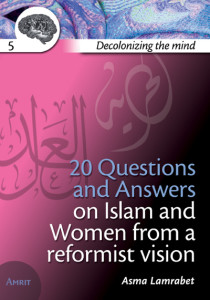In June 2016 IISR will present the book release of Asma Lamrabet, which carries the title “20 Questions and Answers on Islam and Women from a reformist vision”. For centuries, the question of “women in Islam” has been held hostage by two opposing but equally radical perspectives: one, rigid Islamic conservative; the other, western, ethnocentric, and islamophobic.
 In 20 Questions and Answers Asma Lamrabet criticizes with both perspectives from a reformist approach. She takes the propositions of these perspectives and goes back to the sources – the Qur’an and the Hadith – to analyse the different arguments and weight them against the interpretations. Questions the book deals with are for instance:
In 20 Questions and Answers Asma Lamrabet criticizes with both perspectives from a reformist approach. She takes the propositions of these perspectives and goes back to the sources – the Qur’an and the Hadith – to analyse the different arguments and weight them against the interpretations. Questions the book deals with are for instance:
- Are men and women unequal in Islam?
- Does the Qur’an allow violence against woman?
- Is polygamy a marriage norm in Islam?
- How does the Qur’an address the issue of Muslim woman’s veil or “Hijab”?
Asma Lamrabet is director of the Studies and Research Centre on Women’s Issues in Islam of Rabita Mohammadia des Ulemas located in Rabat, Morocco since 2011.In juni 2016 presenteert IISR de nieuwe publicatie van Asma Lamrabet, getiteld “20 Questions and Answers on Islam and Women from a reformist vision”. In het Engelstalige boek bekritiseert de auteur zowel een conservatief Islamitisch perspectief als een etnocentrisch, islamofobisch en westers perspectief over “vrouwen in de Islam”.
In “20 Questions and Answers” bekritiseert Asma Lamrabet beide perspectieven vanuit een reformistische aanpak. Ze neemt de stellingen van deze perspectieven en gaat terug naar de bronnen – de Qu’ran en de Hadith – om de verschillende argumenten te analyseren en te wegen tegen de interpretaties. Vragen die in het boek behandeld worden zijn onder andere:
- Zijn mannen en vrouwen ongelijk in de Islam?
- Staat de Qu’ran geweld tegen vrouwen toe?
- Is polygamie een huwelijksnorm in de Islam?
- Wat zegt de Qu’ran over het dragen van een sluier, ofwel de “hijab”?
Asma Lamrabet is directeur van de Studies and Research Centre on Women’s Issues in Islam of Rabita Mohammadia des Ulemas in Rabat, Marokko sinds 2011. Het boek verschijnt in juni 2016.
